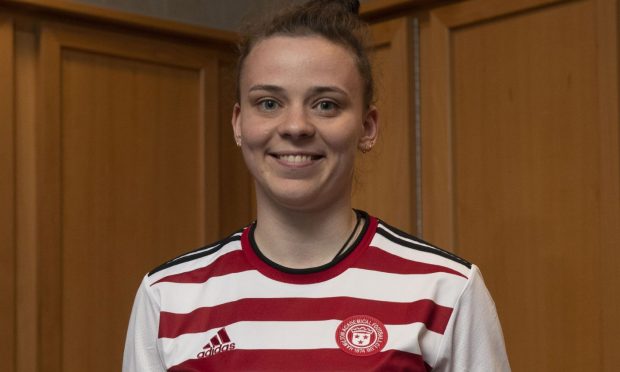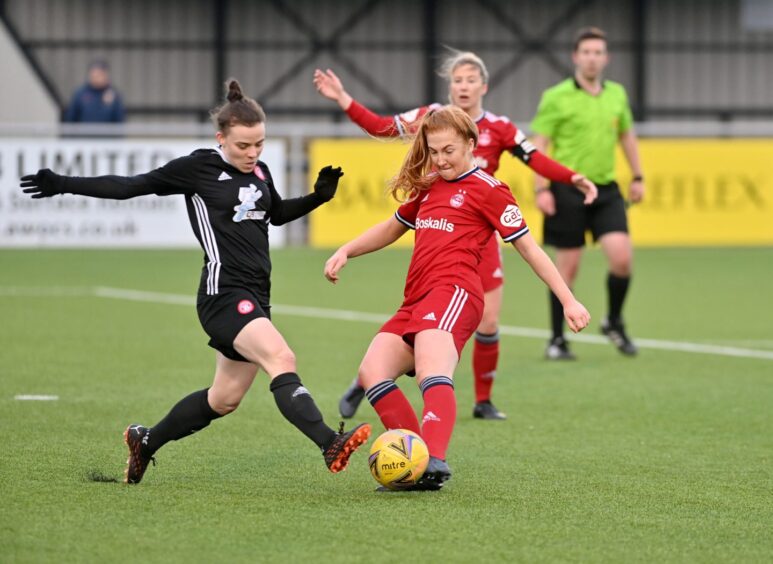
Ahead of the Scottish Women’s Football Awards, we shine a light on one nominee – Josi Giard – who is among those vying for the Outstanding Athletic and Academic Achievement Award.
They don’t give her a special title on the pitch; she’s just Josi to her Hamilton Accies team-mates.
It’s a bit more of a mouthful in her “other” job. Dr Josephine Giard is her Sunday name when she is around Heriot-Watt University where a recently completed PhD is the reason for the letters in front of her name.
Giard completed a doctorate in environmental and biological sciences with the focus of the work researching new antibiotics using novel approaches. Giard hopes that her research and continued work in the field will ultimately lead to new ways to combat disease.
Her next post is a post-doc as she continues research into the field but while it all sounds a little complicated, it’s fairly simply for the 28-year-old.
— Josephine Giard (@JosephineGiard) November 14, 2024
Diagnosed as Type-1 diabetic at the age of eight, Giard’s condition pushed her towards academic study into her condition.
“I do think that my background with diabetes steered my path towards the kind of research that I do, albeit that ultimately I ended up working on things that were entirely unrelated,” she said.
“But when I was younger I was quite focused on trying to find different ways of treating diabetes and, of course, trying to be part of a medical science team who found a cure.
“I do think the fact I was diabetic influenced the way that my studies have gone although they veered off of that path.
“I have just started a new job – my first real job! – at Heriot-Watt University. I am working on a research position doing a post-doc. I love the fact that I am studying an area that is incredibly fascinating and then when I finish work I get to go and play football. For me, I am incredibly passionate about both of these things and it is a privilege to be able to do both.”
Living with diabetes
Nominated for the Kat Linder award for her academic research and advocacy of diabetes, Giard has been fairly relaxed after forging a semi-professional career in football while coping with the autoimmune condition. And she has insisted that there was never a point in her life where she feared her diabetes would prevent her from doing the thing she loved most.
“Because I was so young when I was diagnosed, I have never known anything else,” she said. “I don’t recall a time when I was not diabetic. But I think the attitude of my parents helped shape me because they always said that I shouldn’t let it stop me from doing the things I wanted to do.
“Their view was that anything I wanted to do, we would give it a go and make it work.
“I now wear a sensor on my arm and a continuous glucose pump. I had been very hesitant to use the pump, mostly because I wasn’t sure how it would fit in with football. However, the opportunity came up for me to test it and to see how I got on and I found it helped me and wasn’t obstructive at all.
“I have had isolated occasions when my sensor has been pulled off within a game or the pump has dislodged but generally it has been fine and I have not experienced any real issues. The sensor and the pump communicate with one another to ensure I have the required amount of glucose within my system and it is incredibly effective – and unobtrusive.”
Giard headed to Accies after Celtic where she had gone when she left her native Germany with her colleagues all taking her illness in their stride. “I have always enjoyed the break that football brings,” she said. “I try not to let the fact I am diabetic define me. My team-mates are all aware and will sometimes ask if I need anything but they just get on with it and accept it.”
There is so much that goes into pre-match preparation for any player with sports science now fundamental to every team, regardless of what level.
For Giard, though, there is so much more to consider than just who her opponent is within a game or what tactics the team are playing.
“I have always managed to control my bloods through exercise,” she said. “Usually at a game I find that my bloods are quite high because there is so much adrenalin so I try and eat quite a long time before I am playing.
“I usually have glucose tablets at the side of the pitch and a drink in case I need them during the game but I am lucky; I don’t think I have ever really had a bad ‘hypo’ within a game.
“I have had points when I know I am low and I have to get some glucose but I have been good at recognising the signs of my body before it gets too serious.
“Sometimes it can be frustrating, for example when there is a big game and you have a lot of nerves and a lot of adrenalin and you can find that can affect bloods. Usually if I am too high then I am tired and a little bit sluggish, too low and I can feel that my legs are a little wobbly and I feel unsteady, as though I have nothing in me.
“But mostly I try to switch off from it and don’t spend too much time thinking of my diabetes. It is a part of me but it is not definitive of me.”
Role model
While Giard is comfortable with her own condition, she has also been able to act as a role model to newly diagnosed players who are struggling to come to terms with the illness, for which there is still no cure.
“I have spoken to younger players and their parents at times,” she said. “It is good for them to see someone who has been able to keep playing and keep living life to the full. I am always happy to talk about it and to share my experiences. I think that can be so important when it comes to offering some encouragement, especially in those first few months.”
Forward @JosephineGiard has been nominated for the @ScotWFootball Kat Linder Award for completing her Doctorate in Environmental and Biological Sciences.
Josi’s work has involved researching for new antibiotics using novel approaches. She hopes that her research, and her… https://t.co/bCNfKrhakQ pic.twitter.com/GMKQ6L0872
— Hamilton Academical Womens Football Club (@accieswfc) October 27, 2024
For now, Giard’s focus is on continuing her academic research while also making sure that Accies continue what has been a hugely impressive start to the season.
“This season I want to help Hamilton Accies get straight back to the top flight,” she said. “We have made a decent start to the season and it has gone well but I want to hopefully get us promoted. I am a doctor now, too, and am looking forward to working within my research field.
“It is always a nice position to be in, to feel stimulated and motivated in work and then leave to go and truly focus on another great passion. It feels like exciting times.”
On Saturday, the gongs will be handed out at the hugely prestigious SWFA annual awards. The Sunday Post is media partner for the event, and next week’s edition will include a special pull-out featuring all the winners.

Enjoy the convenience of having The Sunday Post delivered as a digital ePaper straight to your smartphone, tablet or computer.
Subscribe for only £5.49 a month and enjoy all the benefits of the printed paper as a digital replica.
Subscribe
 © DCT Media
© DCT Media